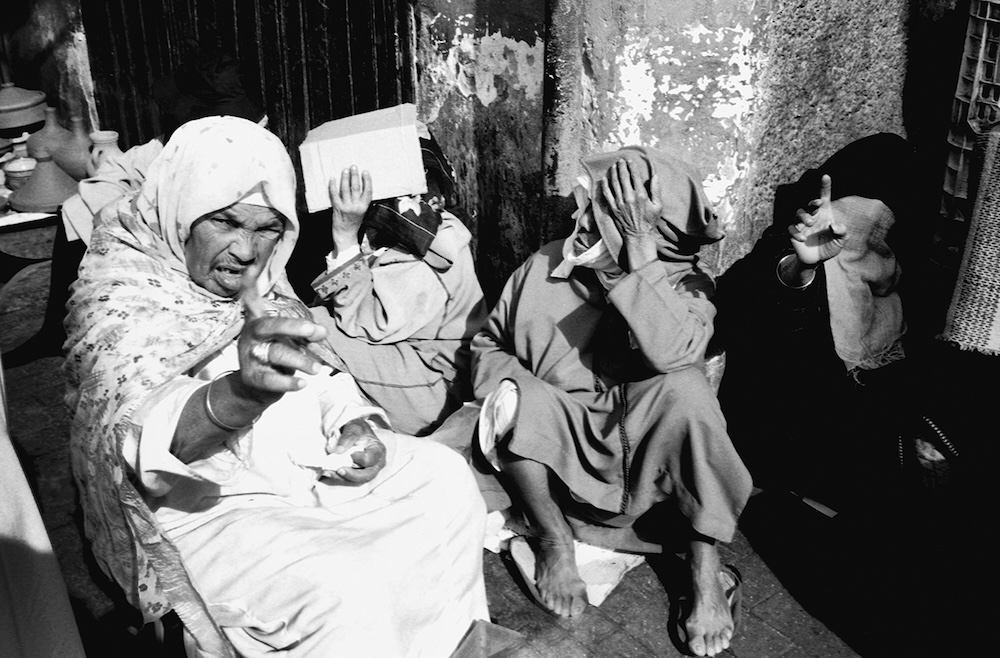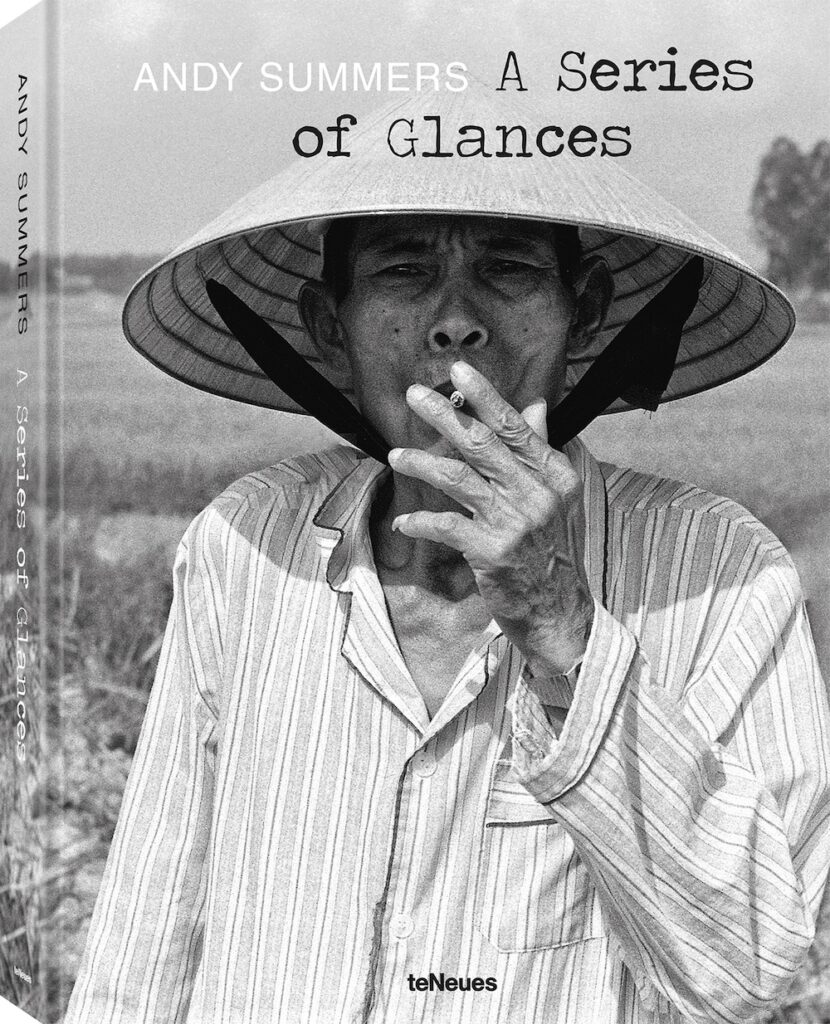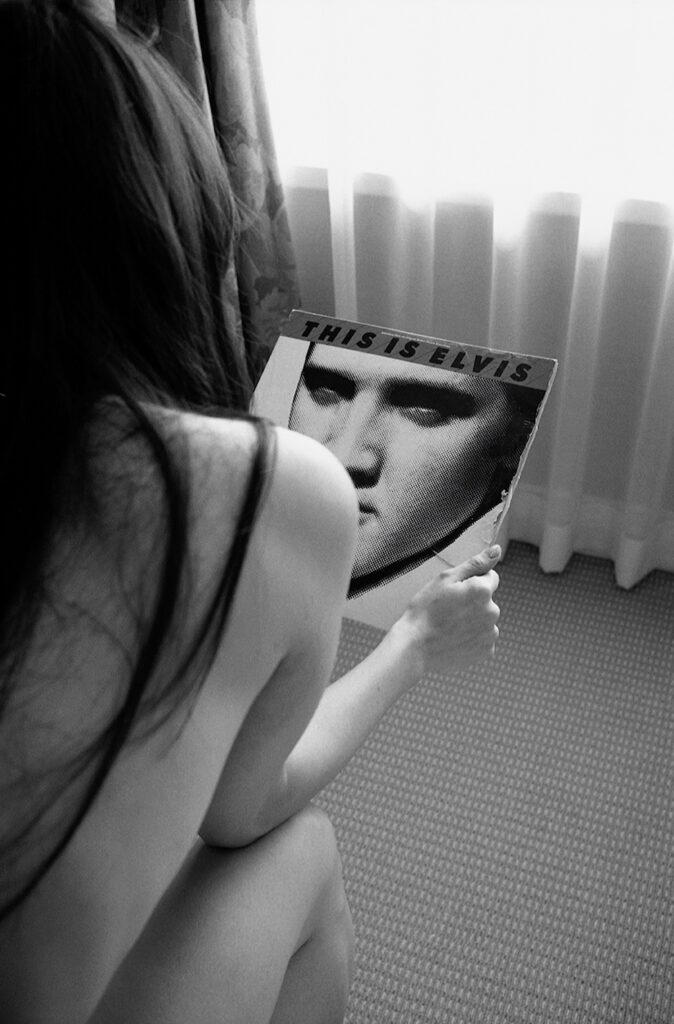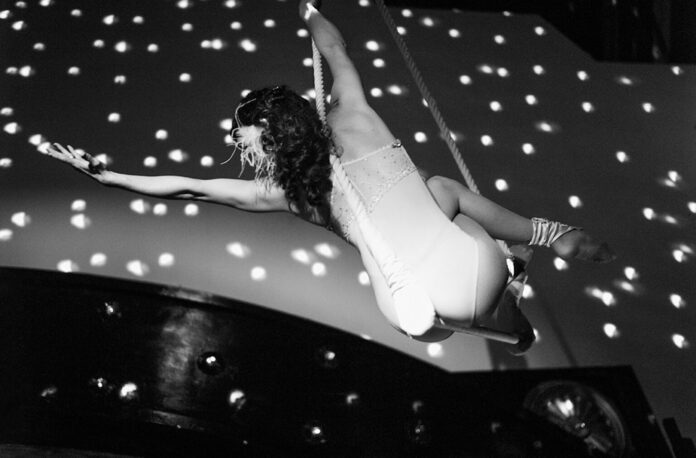The stage lights fall on a man whose career has always been defined by motion—whether his hands sliding across guitar strings, his eye fixed on the viewfinder of a Leica camera, or his pen scratching across paper. Legendary guitarist Andy Summers—Rock and Roll Hall of Fame inductee, five-time Grammy winner, and co-architect of one of the most influential bands in rock history—is returning to San Francisco with a show unlike anything he’s done before.
The Cracked Lens + A Missing String, his current tour that hits Presidio Theatre on Sat/27, is not simply a concert, nor just a photography exhibition, nor a reading. It’s all of those things, arranged with the deliberation of a music album yet unfolding in the ephemeral immediacy of live performance. For Summers, who first began exploring this format in 2023, it feels both inevitable and surprising.
“This is multimedia,” he says. “What surprises me is that I had never done it before. I’ve been involved in photography exhibitions and concerts for years. And it was only two and a half to three years ago that I suddenly thought, ‘Let’s merge the two.’ It’s hardly the first time anybody’s ever thought of doing that. But finally, I thought I could do it. I’ve been doing it quite a lot now around the world. This is a small tour now. This is eight shows, ending in San Francisco. I’m thrilled to be doing it.”
Summers’ “small tour” belies the scope of what he presents on stage. Audiences sit in the dark while sequences of his photographs—taken over the course of decades of travel, performance, and restless observation—spill across a massive screen. To these shifting images, he adds improvised guitar, weaving in selections from his solo catalog, fragments that might evolve into full compositions, and the occasional Police classic reimagined through new visual contexts. Between songs, he reads excerpts from his short story collection Fretted and Moaning, shares anecdotes, and crucially, speaks to the audience as if hosting them in his living room.
“I’m very aware of the audience and the fact that they’re there,” says the guitarist. “And I tell a few stories, which help make it a more multimedia show. It’s been interesting to do it, and we haven’t failed. Every night, it’s an excellent feeling. People love it.”
That love is hard-earned. Summers is not interested in nostalgia packages or recycled greatest-hits shows. His performances are more akin to an artist’s gallery talk, where he improvises connections between mediums and lets new meaning emerge in real time.
“My next task, if I have the time to do it, is to change the opening sequence, which is currently black and white, to all color,” he says. “I’ve got some great color stuff, so it’s a work in progress. Most of the performances in front of the screen are set up, and then I improvise with excellent guitar sounds to the images. I know where I’m going to go, but it’s different every night. It’s live improvisation and interpretation.”
The language he uses to describe photography could just as easily map his approach to the guitar. Asked if there’s a parallel between editing a photo sequence and building a record, Summers doesn’t hesitate.
“The best way to assemble photographs and even take them is to look for a sense of musicality in the process, much like I’m working on a sequence in my photography studio,” he says. “It all starts with the feeling of music. There’s a musical quality to it … I start improvising and I usually arrive at my destination.”

That interplay between structure and spontaneity, between instinct and refinement, drives both his studio work and his live shows. He’ll spend hours developing scraps of melody recorded on his phone—hundreds of them—into fuller pieces at his home studio.
After the long quiet of the pandemic, returning to that rhythm felt like reclaiming a pulse. “With Covid and all that, I hadn’t made a new record for over three years,” says Summers. “But now I’m back in, and I can feel it every day—we’re loosening up. We’re getting faster and better at it.”
His most recent release, Vertiginous Canyons, was released both as a digital EP and as the soundtrack to his photography book, A Series of Glances. The next record promises a different texture.
“What I’m doing now is more complex, and it’s got drums and bass on it,” he says. “I’m going to make an album in the way I’ve always made them, so that I build all those moments throughout, rising and falling.”
Pressed to categorize it, Summers calls it “progressive modern music.”
“It’s sophisticated in terms of its structures, harmonies, and so on,” he says. “But I’m also aware, being who I am, that I have to play some pretty nifty guitar solos on it. Most of the tracks have solos because I’m duty-bound to do that. But because I enjoy it and I’m good at it.”
Photography, meanwhile, is less an avocation than another language he speaks fluently. His images have been showcased in over 60 exhibitions worldwide. He published his first significant book Desirer Walks the Streets in 2007; I’ll Be Watching You, which compiled photographs taken during the Police’s touring peak, became a fan favorite. His newest, A Series of Glances, marks a shift.

“I’ve never done this before, making an all-color book,” says Summers. “I started shooting in color a couple of years ago, and I enjoyed it. It changes your perspective a bit. But I now have more information than I did when I first started. I’ve been fortunate enough to travel the world constantly with a camera.”
What began in the late ‘70s as a way of processing life on the road—roaming New York with a Nikon while the Police were constantly photographed themselves—grew into an art form in its own right. He credits surrealistic black-and-white photographer Ralph Gibson as a mentor and confesses that carrying film cartons everywhere felt natural, even necessary.
“The camera is an instrument and your eye is part of the instrument,” he says. “However, what you develop is that you become more sophisticated.”
As if music and photography weren’t enough, Summers has steadily built a literary career. His memoir One Train Later became the basis for the documentary Can’t Stand Losing You: Surviving the Police. His collection Fretted and Moaning revealed a wry, fiction-driven voice. And now he’s working on a whole novel about a boy searching for his father, adapted from a screenplay he once drafted.
Summers views all his artistic endeavors, including his new tour, as a freedom from expectations and setlists—from the duty to replay old triumphs exactly as they were.
“It’s not within the confines of a group with a certain number of hits, which you’re duty-bound to play every night because people have paid money to come and hear them,” the guitarist says. “This show that I’m doing is very different. It’s nothing like what I did in the Police at all. It’s primarily a visual show with a guitarist.”

He has grown comfortable as a raconteur, too. “The more I’ve done it, the more I thought, ‘Well, I don’t even need the guitar when I just do the stand-up,” says Summers.
Audiences, he notes, tend to leave “with a nice feeling that they watched something of quality, and they saw lovely imagery. It’s not just some dumbass rock show. It’s a thought-out and aesthetically pleasing experience, conducted with your genial host.”
The final stop on this run, San Francisco, feels like a homecoming for the guitarist who’s played here many times over his career, from his time with The Animals and Soft Machine to the Police.
“I’ve always loved going there,” he says. “Like many people, I have a great affection for San Francisco. It’s the most beautiful city in the US, with a particular character. This little tour ends in San Francisco, which is quite thrilling to me. I think we’ll be sold out, and it’ll be a charming occasion.”
For Summers, the city is a site of memory and renewal, a place where the young guitarist once found his footing amid the chaos of the late ’60s and where the seasoned artist now presents a deeply personal synthesis of all he has learned.
“There’s no reason to stop,” he insists. “I am quite useful for my age. I’m fortunate. I’m in perfect health. Nothing wrong with me. The thing that keeps me going is creativity.”
In San Francisco, that creativity will take shape as music, image, word, and story—a lifetime refracted through strings and shadows.
ANDY SUMMERS Sat/27. Presidio Theatre, SF. Tickets and more info here.








